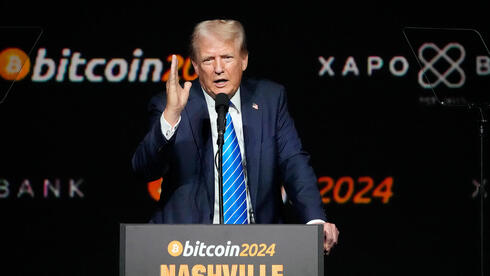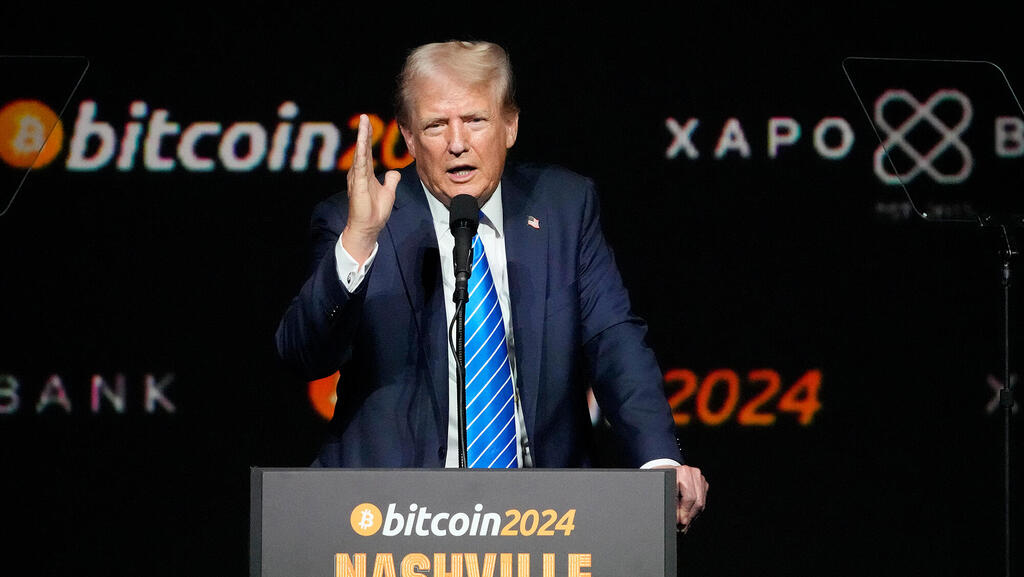
Make Bitcoin Great Again: Crypto industry unites around Trump
The Republican presidential candidate attended a crypto conference in Nashville over the weekend, reversing his previous stance by supporting the community he once dismissed. Kamala Harris also hopes to win votes this way, distancing herself from President Biden's rigid stance against the industry.
Former President Donald Trump, notorious for multiple bankruptcies, is trying to rally the crypto community to his side. Apparently, in his view, as well as in the opinion of certain elements in the crypto community, there is nothing more worthy than the support of the leading candidate for the presidency of the United States for a community that rose up to break away from the government. “If I am elected, it will be the policy of my administration, United States of America, to keep 100% of all the bitcoin the U.S. government currently holds or acquires into the future,” he said at the crypto conference in Nashville, where he was a keynote speaker. The goal, according to him, is for the United States to be the "crypto capital of the world."
The United States owns approximately 213,000 bitcoins. It did not purchase these coins but confiscated them in a series of enforcement actions against illegal actors such as Silk Road, the black market that was a thriving global center for drug, weapons, and human trafficking. After the value of Bitcoin jumped by more than 50% since the beginning of the year and is traded today at about $67,500, the value of this pool is about $14.5 billion. This is a considerable sum, although it pales in comparison to the federal government's gold reserves - 8,133 tons, the largest in the world, worth approximately $480 billion.
Trump, who, like his opponent Kamala Harris, is now vying for every possible vote, promises much more than that. Among other things, he announced to the attendees of the conference that in the first 100 days of his term, he will establish an advisory committee for bitcoin and crypto to design transparent regulatory rules for the benefit of the industry. He will also work to establish a framework for the promotion of stablecoins (whose value is pegged to the dollar) for the purpose of expanding the dominance of the dollar. “I pledge to the bitcoin community that the day I take the oath of office, Joe Biden and Kamala Harris’s anti-crypto crusade will be over … If we don’t embrace crypto and bitcoin technology, China will, other countries will. They’ll dominate, and we cannot let China dominate. They are making too much progress as it is.” he announced to a crowd wearing red headbands with the inscription "Make Bitcoin Great Again", a nod to his slogan: "Make America Great Again" .
Trump hit every target the crypto community could ask for. He promised that the idea of a sovereign stable currency like a digital dollar (CBDC), one of the few state forms challenging the crypto market, will never take off as long as he is president. He announced that he would get the head of the U.S. Securities and Exchange Commission (SEC), Gary Gensler, who is known for his hostility to the industry, fired (a promise that received such loud applause that Trump said he did not know that Gensler was "so unpopular"). He promised friendly regulations for crypto mining businesses and the release of crypto criminals. "Bitcoin does not threaten the dollar. The behavior of the current United States government threatens the dollar," he said and concluded: "The danger to our financial future does not come from crypto, it comes from Washington, DC."
During the Biden administration, the crypto industry experienced some of the heaviest regulatory moves, which came against the backdrop of the collapse of huge companies, including the Israeli-American company Celsius and the trading giant FTX. These companies not only went bankrupt due to dangerous activity and lost many investors' money, but sometimes it was found that their activity was illegal and included fraudulent behavior, defrauding investors and customers, money laundering, and violation of prohibitions on terrorist financing.
Among other things, during the Biden administration, many trading companies were investigated for violations of securities regulations, and several were banned from offering derivatives or unregistered currencies for trading. However, at that time, the Biden administration and Chairman Gensler lost one dominant battle—the Bitcoin ETFs that Gensler tried to prevent but failed in the legal battle.
Trump, who for years was hostile to the crypto industry, today embraces it as part of his campaign. In recent weeks, he has met with industry executives, including the founders of mining companies, wallets, and trading platforms, some of whom even organized fundraising days for him. As part of warming up the relationship, he was invited, as mentioned, to the Bitcoin conference.
The Kamala Harris campaign is also showing relative openness and detachment from the rigid line led by Biden. According to reports, the vice president's advisers have approached crypto industry executives to "reset" their relationship. Among other things, they turned to the largest American trading platform Coinbase, the Circle company issuing stablecoins (USDC), as well as Ripple, a payments company that was the target of legal activity during the Trump presidency.
Harris's team is interested in creating a better "pro-business" image than that usually enjoyed by Democratic candidates. These are helped by the fact that Harris served as chief prosecutor in San Francisco and as attorney general in California, positions that created deep connections in Silicon Valley. President Obama also sympathized with the Silicon Valley industry, and his activity was considered responsible for the strong growth of the technology sector, but also for the concentration of monopolistic power in the hands of individual technology companies.
The flattery of the crypto community on the part of Trump, and also the openness of the Harris headquarters, may be due to the economic power that this community has begun to exercise in Washington in recent years. The crypto industry raised over $200 million for lobbying activities for the 2024 elections, including from Coinbase, the Andreessen Horowitz venture capital fund, and Ripple. So far, $121 million has been invested in lobbying, according to OpenSecrets data.















